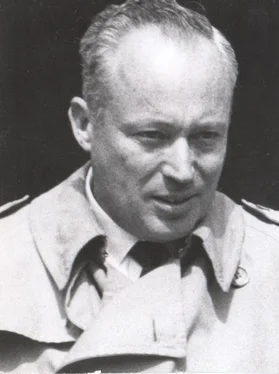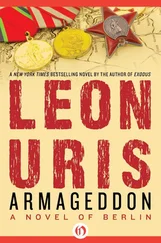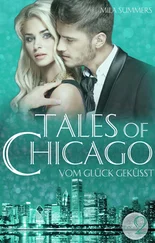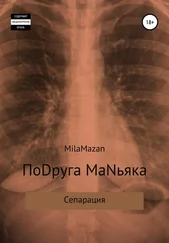Blood and sinew and muscle and shrieks soared skyward. Nuts and bolts erupted like an angry volcano. Disintegrated bits of a hundred Germans floated back to earth. The near living, the half living whimpered with shock, and the neatly deployed living were terrified.
The three German squads in the courtyard were met with a barrage from the factory, but the land mine had already thrown them into disarray.
From the rooftops Samson Ben Horin’s Revisionists—Chayal, Jabotinski, and Trumpeldor—poured a murderous fire at the backs of the Germans stretched out along Nalewki Street.
It was a rout!
Fighters from Andrei’s and Wolf’s commands tore into the streets at the fleeing enemy with a vengeance. Confused Germans guarding the ghetto gates fired into their own troops pouring out. Other Germans tried to leap the ghetto walls. Their hands were sliced to ribbons on the cemented broken glass, their bodies tangled in the barbed wire.
Wolf’s judgment on the planting of the kasha bowl was confirmed.
Chapter Sixteen
Journal Entry
THE THIRD DAY
Today we administered to the Germans their most humiliating defeat of our infant rebellion. I shall describe it.
The Reinhard Corps who survived the first day and Ukrainians, Litts, Latts, and Estonians assembled at their parade ground off 101 Zelazna Street and crossed and marched along the wall along Leszno Street, apparently to enter at Tlomatskie Gate. Rodel has been anticipating such a move against the uniform factory. The Germans moved in the former “Polish corridor,” a slot between two sets of walls. Rodel’s Fighters had rounded up twenty ladders. With the Germans singing and marching in the “protected” corridor, they rushed the ladders against the wall, climbed, and pelted pipe grenades down on the Germans. The enemy never even got into the ghetto!
Later in the afternoon Germans poured through four gates behind heavy machine-gun and mortar barrages. Our strategy: let them in. Their protective barrage must lift quickly after their troops penetrate. Then we hit them from the rear. All four times we drove them out.
Two events to hearten us! The first Russian bombers’ passed overhead for an air raid (on Germany, we hoped). We cheered them wildly!
Tonight the Germans admit on the radio broadcasts that the “Polish bandits” have been joined by Jewish gangs (perverts, subhumans, nun rapists, etc., etc.). This admission that they are fighting Jews is bound to have an impact on the people.
THE FOURTH DAY
Our friends arrived at dawn. This time they neither sang nor marched in formation. They moved in dispersed, heavily, armed formations. After artillery, mortars, and machine guns drove us to cover, they came in slowly. They crept along in the shadows of the building. We no longer suffer from fright. It is they who show fear. We allow them to get deep into the ghetto, and then we hit them with cross fires at intersections, hurl fire bombs and grenades down from the roofs, shout at them in German to confuse them, jump them from the rear.
Today they concentrated on the uniform factory. We estimate they used a thousand troops to seal it off. Rodel's forces harassed them unmercifully, but they managed to get a few hundred workers out. Frantic for a victory, they blew up a hospital near Pawiak Prison. All but the bed patients had long been evacuated.
THE FOURTH NIGHT
Banks of floodlights in tall buildings over the wall lit up large sections of the ghetto. Their troops moved in to continue with a night attack on the uniform factory. Simon and Andrei have spoken of this possibility (night action) for some time. Simon tried our most daring foray. Broken into three groups, our people dressed in German uniforms taken from the factory and trimmed (leather belts, helmets, even decorations) from fallen enemy. Group 1 was led by Andrei, Group 2 by Simon, and Group 3 by Tolek Alterman. Our “Germans” merely marched out of the ghetto. The enemy mistook us. We got them completely off guard. Simon’s group attacked the floodlights and artillery. They wrecked twenty floodlights and five cannons. Tolek’s group raided the arsenal at SS barracks, captured a machine gun and twenty rifles and several thousand rounds of ammunition (desperately needed).
Group 3, Androfski split into two parts. Part one raided the central market and “confiscated” three trucks loaded with food. The second unit raided the Citadel Hospital for medical supplies.
We know we have reached our high-water mark. We cannot use German uniforms at night again, as they will undoubtedly think of using a password to prevent future occurrences. (Further testimony to their respect for us as a fighting force.) Nevertheless, we can continue to confuse them in the day by sudden attacks, wearing their uniforms.
THE FIFTH DAY
We took inventory. Ammunition is very, very low. Schlosberg has manufactured four more smaller versions of the kasha bowl. We have planted them at key intersections, hoping for the best.
Simon called in all commanders and called for less concentrated fire on the enemy and more “individual improvisation.” Translated, this means more acts of individual heroism.
Our Fighters responded today with incredible acts of courage. A tank blew up on one of the planted mines on Nowolipki, but another tank and armored car were stopped literally barehanded. A Fighter from Rodel's command leaped on the tank, threw open the hatch, and hurled a bottle inside! The armored car was stopped by Fighters leaping on it from a second-story window with grenades in their hands.
The Germans sense we are running short of ammunition. They are pressing us harder. Thank God they have not been able to replace the floodlights we destroyed. Tonight the ghetto was dark. Our fighters need sleep desperately.
THE SIXTH DAY
Incredible acts of heroism continue to save the day. Wolf’s command reports the following:
Two Fighters without guns leaped on a German squad with knives; killed two, three fled. They took the weapons.
Rachael Bronski was caught by a squad of Germans as she tended a wounded Fighter. She reached inside her skirt and flung a hidden grenade at them.
In the central area, Andrei tells me that his people are making the Germans fight house by house, room by room. We start at the ground floor and make the Germans pursue us up, step by step, to the roof. We hurl bombs and grenades on them and we continue to fight clear up to the roof. The Germans quit. They will not come on the roofs.
From Rodel’s command: Saul Sugarman, an old-time Bundist, was badly wounded. He refused to die until he crawled back to his bunker and gave his rifle to his brother.
Simon has called for hit and run only when we are behind the Germans; not to meet them head on. We don’t have the ammunition. We should adjust our positions so that we can retreat and lead them into dead ends to use our bottle bombs with the most effect.
The Germans have managed to unearth a few bunkers of civilians. They have been marched out of the ghetto. I hear that Boris Presser and his family were taken to the Umschlagplatz today. Well? What can one say? Has there ever been a doubt of Jewish courage? I suppose we all have wrestled with that. Andrei confided to me that it crossed his mind on the first day when he saw the six tanks come up Zamenhof Street. I hope these past six days answer that question forever. Sacrifice is commonplace. Not a single Fighter has surrendered.
THE SIXTH NIGHT
Still no replacement for the destroyed floodlights. The Germans press in on night patrols to keep us from sleeping. We butchered them.
Читать дальше












